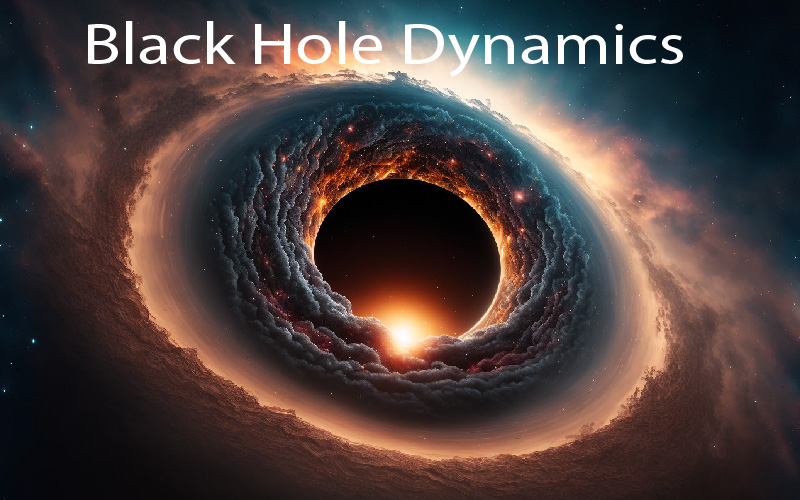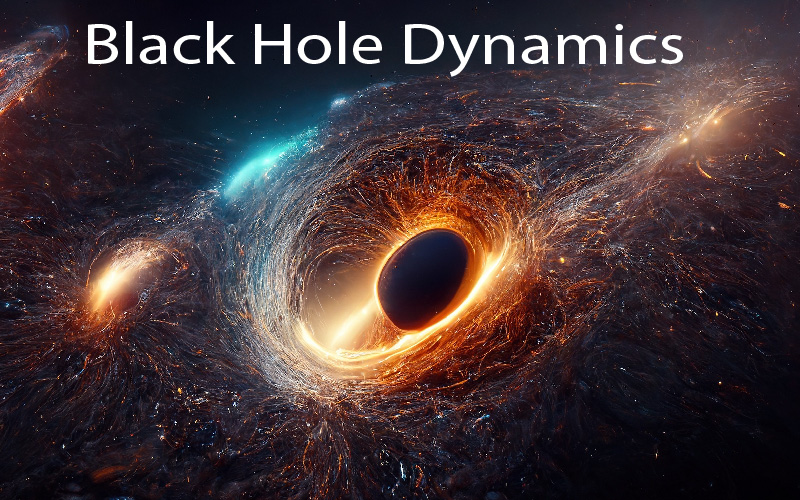Exploring the Intricacies of Black Hole Dynamics
Embark on a mind-bending journey through the cosmos as we delve into the enigmatic realm of black holes. These cosmic giants, lurking in the depths of space, hold secrets that challenge our very understanding of reality. Join us as we unravel the mysteries of black hole dynamics and explore the intricate dance between gravity, time, and space. Get ready to have your imagination stretched to its limits and beyond!

Understanding Space-Time and Its Relationship with Black Holes
Space-time, a fundamental concept in physics, is the fabric of the universe that combines three dimensions of space with one dimension of time. It’s like a cosmic stage where all events occur and interact dynamically. When it comes to black holes, this relationship becomes intriguingly complex.
Black holes are regions in space where gravity is so intense that nothing, not even light, can escape their gravitational pull. They warp the very essence of space-time itself, bending it to their will. Imagine a massive stone placed on a stretched-out trampoline; it creates a deep dent that distorts the fabric around it.
As objects get closer to a black hole’s event horizon – the point of no return – they experience extreme gravitational forces and time dilation effects due to the intense warping of space-time. Understanding these phenomena sheds light on how black holes influence not only nearby celestial bodies but also our broader understanding of astrophysics.
Theories and Discoveries in Black Hole Dynamics
Theories and discoveries in black hole dynamics have captivated the minds of scientists and space enthusiasts alike. One of the most well-known theories is Einstein’s theory of general relativity, which forms the foundation for our understanding of how gravity works in extreme conditions like those found near a black hole.
Recent discoveries have shown that black holes may not be as ‘black’ as once thought; they can emit radiation known as Hawking radiation, slowly losing mass over time. This revelation challenges previous assumptions about these cosmic entities.
Another fascinating theory is the concept of wormholes, hypothetical passages through space time that could potentially connect distant parts of the universe or even different universes altogether. While still largely speculative, exploring this idea could revolutionize our understanding of space-time and its complexities.
New technologies like gravitational wave detectors have enabled scientists to observe black holes colliding billions of light-years away, providing unprecedented insights into their dynamics. These groundbreaking discoveries continue to push the boundaries of human knowledge and inspire further exploration into the mysteries of our universe.

Observing Black Holes: Techniques and Advancements
When it comes to observing black holes, scientists have made significant advancements in recent years. One of the key techniques used is capturing images through telescopes that can detect the radiation emitted by matter falling into a black hole. These observations help researchers study the behavior and characteristics of these enigmatic cosmic entities.
Another method involves analyzing gravitational waves, ripples in space-time caused by massive objects like colliding black holes. By detecting these gravitational waves, scientists can infer the presence of black holes and gain insights into their dynamics and interactions.
Furthermore, advancements in technology have led to more sophisticated instruments like the Event Horizon Telescope, which successfully captured the first-ever image of a black hole’s shadow in 2019. Such breakthroughs open new avenues for studying these celestial phenomena and deepening our understanding of the universe’s mysteries.
Implications of Black Hole Dynamics on the Universe
The implications of black hole dynamics on the universe are profound and far-reaching. These enigmatic cosmic entities have a gravitational pull so strong that not even light can escape, altering the very fabric of space-time itself. As black holes devour matter and energy, they shape their surroundings in ways that challenge our understanding of physics.
Their immense gravitational force influences the movement of stars, galaxies, and other celestial bodies in their vicinity. In some cases, black holes can even merge with one another, releasing powerful gravitational waves that ripple through space-time.
Studying black hole dynamics provides valuable insights into the evolution and structure of galaxies. By observing how they interact with their environment, scientists can better comprehend the mechanisms driving cosmic phenomena on a grand scale.
Furthermore, exploring black holes helps us unravel mysteries about the origins of the universe and its continued expansion. The more we learn about these cosmic behemoths, the more we uncover about our place in the vast expanse of space.
Controversies and Debates Surrounding Black Hole Research
Black hole research has always been a hotbed of controversies and debates in the scientific community. One of the ongoing discussions revolves around the information paradox, questioning what happens to all the information that falls into a black hole. Some argue that it is lost forever, while others propose alternative theories like holographic principles.
Another contentious topic is whether black holes truly violate the laws of physics or if our current understanding needs refinement. The concept of singularity at a black hole’s core challenges our conventional understanding of space-time and requires further exploration.
Furthermore, disagreements persist regarding the firewall paradox, which suggests that an intense wall of energy would destroy anything crossing a black hole’s event horizon. This idea clashes with traditional views on how matter interacts near these cosmic anomalies.
These controversies fuel ongoing research efforts to unravel the mysteries surrounding black holes and push the boundaries of our knowledge in astrophysics.
The Future of Studying Black Hole Dynamics
The future of studying Black Hole Dynamics holds an array of exciting possibilities that could revolutionize our understanding of the cosmos. Scientists are constantly pushing the boundaries of technology and innovation to delve deeper into the mysteries surrounding these enigmatic cosmic entities.
One key area of focus in upcoming research is utilizing advanced telescopes and sensors to capture even more detailed images and data from black holes. This enhanced observational capability may provide crucial insights into their behavior and interactions with surrounding matter.
Moreover, theoretical physicists are working on refining existing models and developing new theories to explain phenomena like Hawking radiation, gravitational waves, and quantum effects near black hole horizons. These efforts could lead to groundbreaking discoveries that challenge our current understanding of physics.
Collaborative international projects, such as the Event Horizon Telescope consortium, demonstrate how pooling resources and expertise can yield remarkable results in studying black holes. By fostering interdisciplinary collaborations across various scientific fields, researchers aim to unlock further secrets hidden within these cosmic enigmas.
Conclusion: Why Studying Black Holes is Vital to Our Understanding
As we delve deeper into the complexities of black hole dynamics, it becomes evident that these enigmatic cosmic phenomena hold the key to unlocking some of the universe’s most profound mysteries. Studying black holes is not just an academic pursuit; it is a journey towards understanding the very fabric of space-time and our place within it.
By exploring black holes and their dynamics, we gain insights into gravity, quantum mechanics, and the fundamental forces that govern our existence. The implications of unraveling the secrets of black holes extend far beyond astrophysics; they touch upon philosophy, technology, and even our perception of reality itself.
In a world where so much remains unknown, studying black hole dynamics offers us a glimpse into the workings of the cosmos on a scale that is both mind-boggling and humbling. As we continue to push the boundaries of scientific discovery, embracing the challenges posed by black holes will only deepen our understanding of the universe and our place in it.
So let us venture forth with curiosity and determination, for in studying black holes lies not only knowledge but also wonderment at the vastness and intricacies of space-time. May our pursuit be relentless, fueled by a thirst for knowledge that transcends borders and unites us in awe of what lies beyond?